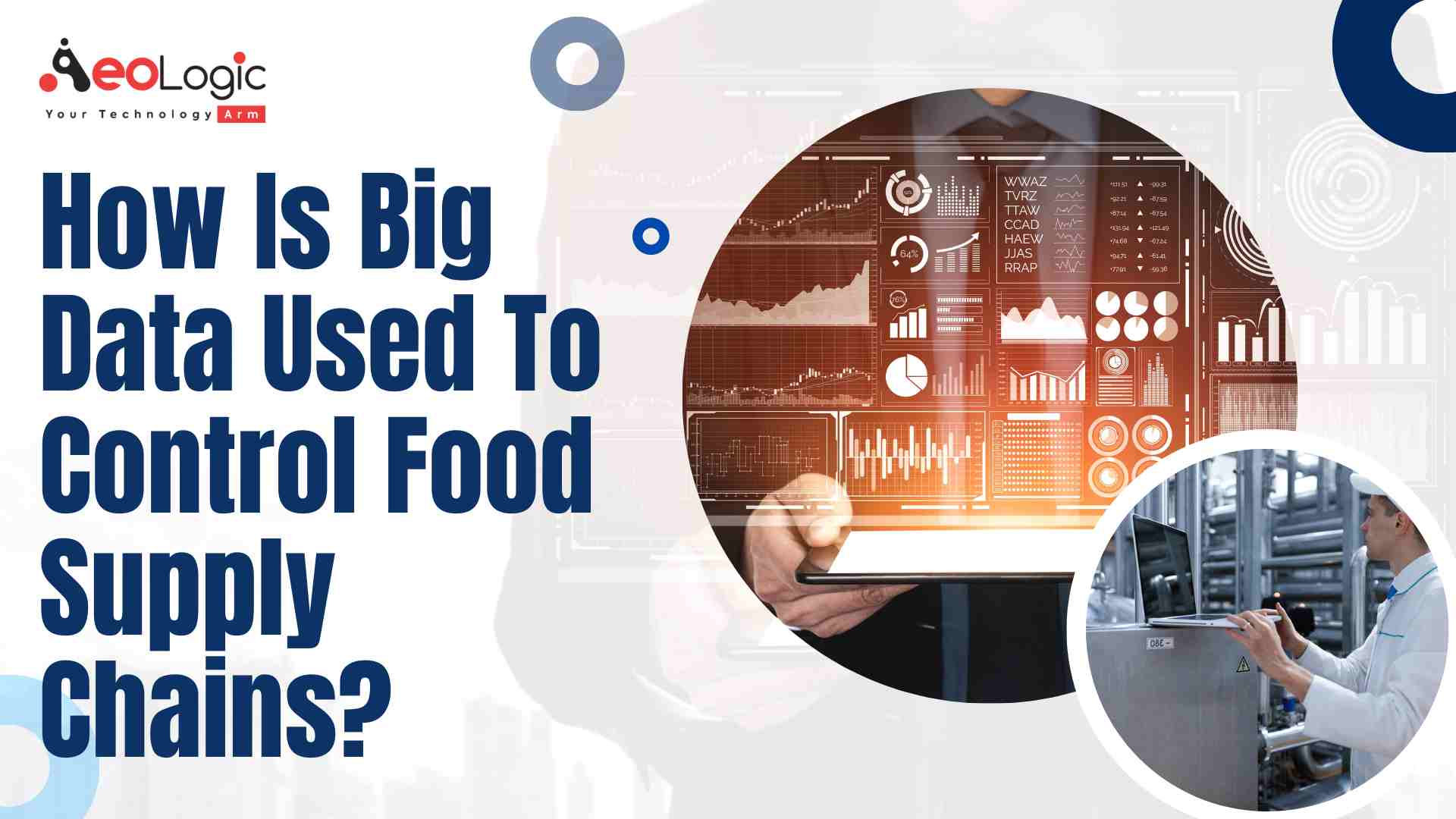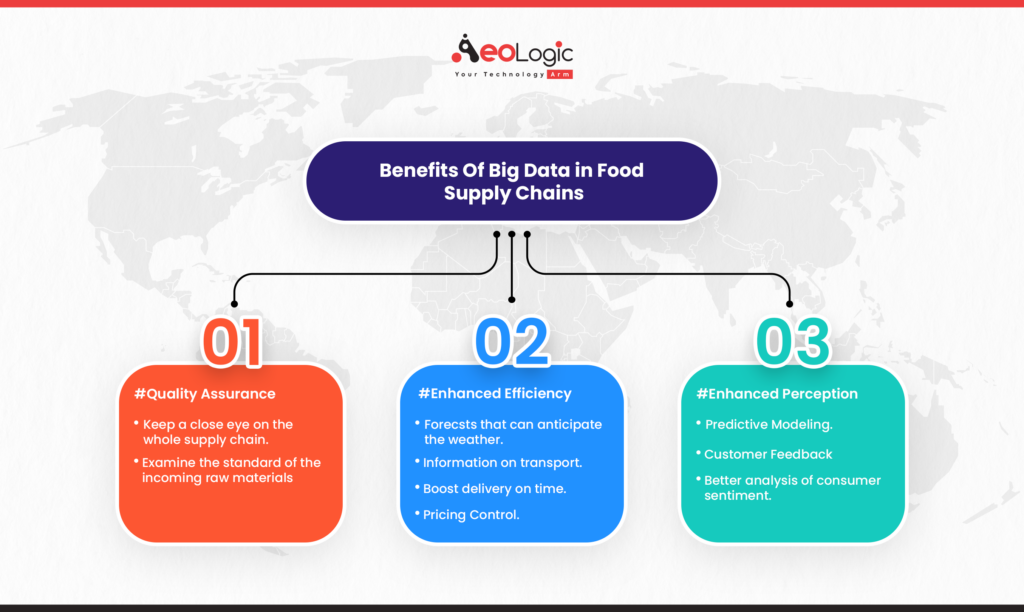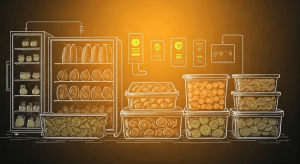The world’s food supply is increasingly integrated, with the global production of maize being an example. Maize from different regions of the world is traded in international markets and transported to most continents. The complexity of this network has led to data-driven systems being used to manage the supply chain. In this post, we will examine how is big data used to control food supply chains?
“Big Data” is a term often used to describe the exponential growth and accessibility of data on an individual, business, or government level. It includes data from social media and other digital sources, as well as more traditional information such as demographics, environmental data, financial decisions, and much more. This access to large amounts of data has led to increased transparency in many industries. Lets begin!
Table of contents
- Overview
- What is Big Data?
- Recent Use of Big Data in Food Supply Chains
- How is Big Data Used to Control Food Supply Chains?
- What are the Implications of Big Data for the Supply Chain?
- The Future of Big Data in Food Supply Chains
- Conclusion
Overview
As the world becomes increasingly connected, the need for efficient and reliable food supply chains has never been greater. Big data is playing an increasingly important role in controlling food supply chains, from farm to table.
Farmers are using big data to track everything from the weather and soil conditions to the health of their crops. This information allows them to make more informed decisions about when to plant and harvest, as well as what type of crops to grow.
Big data is also being used to track the movements of livestock. This information can be used to help farmers prevent disease outbreaks, as well as to improve the efficiency of slaughterhouses and other food processing facilities.
Finally, big data is being used to track consumer behavior. This information can be used by manufacturers and retailers to ensure that they are meeting consumer demand. It can also be used to help identify new trends and develop marketing strategies.
According to recent estimates, the food industry is now worth more than $5 trillion, with a large majority of it coming from food production and distribution. With such a high value on these processes, big data has played a major role in helping food supply chains become more efficient and accurate.
Also Read: 10 Ways to Use Artificial Intelligence to Improve Business Processes
What is Big Data?
Big data is a term used to describe a massive amount of data that is generated from various sources. This data can be used to track and analyze trends in order to better understand and manage supply chains.
Recent Use of Big Data in Food Supply Chains
In the past few years, big data has been used increasingly to control food supply chains. This has been done in a few different ways.
First, big data is used to track the movement of food through the supply chain. This information can be used to identify bottlenecks and optimize the flow of food.
Second, big data is used to monitor food quality. This information can be used to identify problems early and prevent them from becoming serious issues.
Third, big data is used to forecast demand. This information can be used to ensure that there is enough food to meet future demand.
Fourth, big data is used to improve logistics. This information can be used to route food more efficiently and reduce waste.
Finally, big data is used to enhance communication between stakeholders. This information can be used to improve coordination and collaboration throughout the supply chain.
By using big data, food supply chains can be more efficient and effective. This results in better quality food at lower prices for consumers.
How is Big Data Used to Control Food Supply Chains?
Big data can be extremely helpful in managing food supply chains as it can provide insights into patterns and trends that would otherwise be difficult to detect. For example, big data can be used to track the movement of food items throughout the supply chain, identify areas of waste or inefficiency, and predict future demand.
While big data has the potential to revolutionize the way we manage food supply chains, there are also some challenges that need to be addressed. For example, collecting and storing all of this data can be expensive and time-consuming. Additionally, it can be difficult to ensure that the data is accurate and free from bias.
Despite these challenges, big data is already having a significant impact on food supply chains and is likely to continue to do so in the future.
What are the Implications of Big Data for the Supply Chain?
Big data analytics allows operations managers to have a minute-by-minute snapshot of operations and discover bottlenecks that stymie supply chain activities. Furthermore, consumer trends allow organizations to promote top-selling items and optimize inventories.
Benefits of Big Data in Food Supply Chains
#1. Quality Assurance
- Keep a close eye on the whole supply chain.
- Examine the standard of the incoming raw materials.
#2. Enhanced Efficiency
- Forecasts that can anticipate the weather.
- Information on transportation.
- Boost delivery on time.
- Pricing Control.
#3. Enhanced Perception
- Predictive Modeling
- Customer Feedback
- Better analysis of consumer sentiment
The Future of Big Data in Food Supply Chains
The use of big data in food supply chains is still in its early stages, but the potential applications are vast. Big data can be used to track food items throughout the supply chain, from farm to table. This information can be used to optimize production, identify inefficiencies and areas of waste, and ultimately improve the quality and safety of the food supply.
In the future, big data will likely play an even bigger role in food supply chains. With the advent of new technologies like blockchain and the Internet of Things, it will become easier than ever to track food items and collect data about them. This data can then be used to further improve the efficiency of food production and distribution.
Also Read: The Role of AI in Education And Learning: Just Promises Or Revolution
Conclusion
Big data is becoming increasingly important in the food industry as companies seek to gain more control over their supply chains. By collecting and analyzing data on everything from weather patterns to consumer behavior, food companies can make more informed decisions about where to source their ingredients and how to price their products.
While big data has the potential to improve the efficiency of food supply chains, it also raises concerns about privacy and the misuse of information. As the use of big data in the food industry continues to grow, it will be important to monitor its impact on both the industry and consumers.
If you are interested in elevating your businesses using supply chain technologies, connect with our industry experts at Aeologic Technologies.
- How AI/ML Can Change the Public Transportation Industry
- Transforming Business With Digital Technology in the Oil Palm Industry in India
- Importance of Digital Asset Management in the Retail Industry
- How AI is Transforming the Agriculture Industry
- 10 Ways to Use Artificial Intelligence to Improve Business Processes
- The Future of IoT Technology in Convenience Stores
- Building Manufacturing Resilience Through AI and ML










